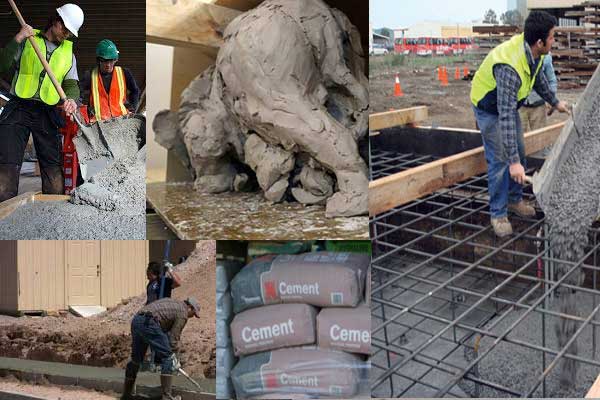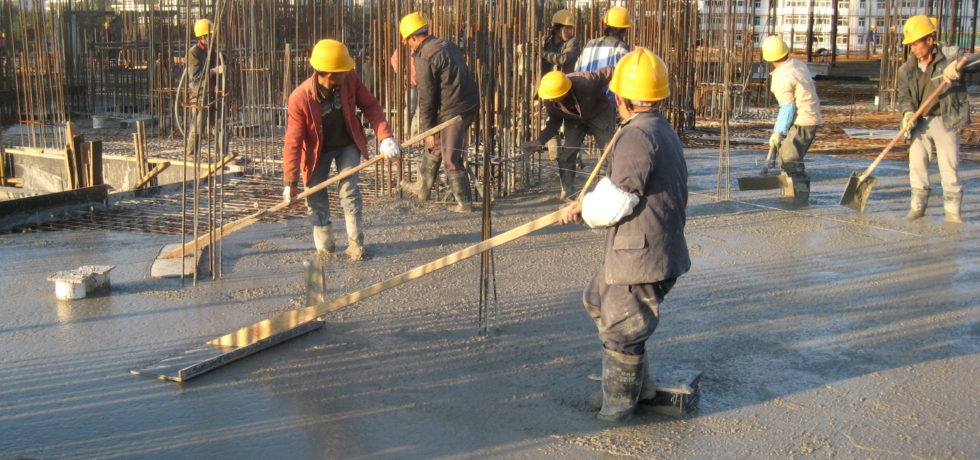Understanding Structural Requirements with West Coast General Engineering concrete foundation: A Complete Guide
Understanding Structural Requirements with West Coast General Engineering concrete foundation: A Complete Guide
Blog Article
The Important Duty of Concrete Foundation in Structural Stability and Long Life
When it involves developing a building, the foundation is more essential than you may assume. Concrete structures supply unparalleled strength and resilience, guaranteeing your structure can withstand numerous environmental challenges. Without a strong base, you take the chance of possible issues like moving or splitting, which can jeopardize security and worth. Understanding the subtleties of concrete structures could be the trick to preserving your financial investment for many years to find. What should you consider next?
Comprehending the Relevance of Concrete Foundations
Concrete foundations are important to the total stability of any type of framework, as they provide the essential assistance needed to stand up to numerous lots and environmental problems. When you consider building a home or a business area, the foundation is the initial point you should think about. It works as an obstacle against wetness, safeguarding your property from water damages. A well-placed concrete foundation also avoids settling and changing, which can lead to cracks in walls and floors. You'll want to assure that the foundation is properly created and reinforced, as this influences the longevity of your structure. Additionally, a strong structure can improve power efficiency by lowering air leaks. Keep in mind, neglecting the value of a concrete foundation can cause pricey repair work down the line. So, buying a high quality structure upfront is important for the stability and resilience of your structure.
Advantages of Concrete Foundations for Structural Stability
While several factors contribute to a structure's architectural honesty, concrete structures offer unparalleled toughness and strength. You'll appreciate that concrete can hold up against severe weather, standing up to both dampness and temperature fluctuations. This resilience indicates your framework is much less likely to experience fracturing or changing in time, which can endanger its safety.Additionally, concrete's intrinsic weight supplies a solid base, avoiding activity throughout natural events like earthquakes or floodings. When you pick a concrete structure, you're also going with reduced maintenance; unlike timber, it will not rot or bring in insects, conserving you time and money in repairs.Moreover, concrete's fire resistance uses included security, ensuring your framework can endure heats without significant damages. Generally, buying a concrete structure means you're focusing on the long-lasting stability and stability of your structure, making it a smart option for any building and construction task.
Typical Types of Concrete Foundations
When it comes to developing structures, comprehending the typical kinds of concrete foundations can help you make educated choices for your task. The most widespread types include slab-on-grade, crawl space, and complete basement foundations.A slab-on-grade structure is a simple, cost-effective option, where a thick concrete piece is put directly on the ground. This kind works well in cozy environments, as it decreases warmth loss.Crawl area foundations raise the home somewhat over ground, permitting air flow and access to pipes and electric systems. This layout can help protect against moisture issues.Full basement structures provide added living or storage room while providing outstanding architectural assistance. They require even more excavation and are usually utilized in chillier environments to protect against frost heave.
Elements to Consider When Creating a Concrete Foundation

Best Practices for Setting Up Concrete Foundations
When you're setting up a concrete structure, proper site prep work is necessary to guarantee security (West Coast General Engineering commercial concrete). You'll also require to recognize reinforcement strategies to improve strength and longevity. Lastly, do not ignore the treating procedure, as it plays a fundamental function in achieving a strong structure
Site Preparation Relevance
Although it may appear straightforward, proper site prep work is crucial for guaranteeing a strong and durable concrete structure. Begin by getting rid of the area of any debris, plants, or organic product that might jeopardize the foundation's honesty. Next off, examine the soil kind and compaction; you might require to excavate or add products to create a stable base. Level the ground to assure even weight circulation and stay clear of resolving problems later on. Setting up proper drainage systems is additionally necessary to protect against water accumulation, which can compromise the foundation over time. Ultimately, define the structure's dimensions accurately to guide the pouring procedure. By adhering to these steps, you'll establish the phase for a successful concrete structure that stands the test of time.
Support Strategies Described
As soon as the site is correctly prepared, the next action in guaranteeing a tough concrete foundation includes applying reliable reinforcement methods. You should start by utilizing steel rebar, which provides tensile toughness and helps avoid fracturing. Lay the rebar in a grid pattern, seeing to it it rises utilizing spacers to keep appropriate insurance coverage. Additionally, take into consideration making use of wire mesh for added assistance, particularly in locations based on hefty loads. Don't neglect to link the rebar intersections securely with cable. For larger foundations, fiber reinforcement can enhance toughness, minimizing the danger of shrinkage cracks. Constantly follow neighborhood building ordinance and guidelines to guarantee conformity. By using these reinforcement techniques, you'll considerably boost your structure's strength and longevity, laying a solid groundwork for your structure.
Healing Refine Fundamentals
To assure your click for more info concrete structure remedies effectively, it is very important to preserve sufficient moisture and temperature conditions quickly after pouring. Beginning by covering the surface area with a damp burlap or plastic sheeting to keep dampness. This keeps the concrete hydrated, avoiding splits and ensuring stamina. You need to also keep an eye on the temperature; optimal curing conditions are in between 50 ° F and 90 ° F. If it's also hot, mist the surface area routinely to avoid rapid evaporation. For cold weather condition, consider making use of protecting coverings to keep warmth. Aim for a curing period of at the very least 7 days, as this is crucial for optimal strength growth. By following these ideal techniques, you'll enhance your foundation's resilience and long life, guaranteeing architectural integrity for years to come.
Upkeep of Concrete Structures for Durability
To maintain your concrete structure solid and long lasting, regular inspections are important. You need to additionally ensure efficient drain solutions remain in area to stop water damage. If you spot any fractures, addressing them promptly will conserve you from bigger issues down the line.

Normal Evaluations and Analyses
While regular examinations and assessments might appear like a task, they're important for maintaining the honesty of your concrete foundation. By consistently examining for splits, shifts, or signs of wear, you can capture possible issues prior to they rise into expensive repair work. Look for any type of water pooling around the foundation or unusual settling, as these can signify underlying issues. It's also sensible to keep an eye on any adjustments in your house's structure, like doors that stick or windows that do not open efficiently. Maintaining a record of your inspections aids track changes with time, permitting positive maintenance. Eventually, these assessments guarantee your structure continues to be secure, sustaining the durability and security of your whole framework. Don't forget this crucial element of homeownership!
Efficient Drain Solutions
Routine examinations can reveal problems like drain issues that could jeopardize your concrete foundation's security. To avoid water build-up, guarantee your seamless gutters and downspouts straight water far from the structure. Installing French drains can properly redirect surface and groundwater, minimizing pressure on your structure walls. In addition, grading the soil around your home helps ensure that water moves away, rather than pooling near your foundation.Consider making use of sump pumps in locations prone to flooding, as they proactively remove excess water. Consistently Website look for blockages in drain systems and clear them quickly. You'll secure your foundation's stability and durability by taking these aggressive steps. Remember, efficient drain services are crucial for maintaining a strong, sturdy concrete foundation.
Trigger Fracture Repairs
When you notice splits in your concrete structure, addressing them without delay is necessary for maintaining its durability. Tiny splits can quickly progress right into larger problems, endangering the structural honesty of your home. Regularly check your foundation for indicators of damage, such as horizontal or upright cracks. If you spot any type of, do not wait-- fix them quickly. You can utilize epoxy injections or concrete patching compounds, which work for securing splits. Always adhere to the manufacturer's instructions and take into consideration getting in touch with a specialist for considerable damages. Remember, timely repair services not just improve your foundation's durability but additionally conserve you money in the lengthy run by preventing extra extensive repairs down the line. Stay aggressive, and your foundation will certainly remain strong and protected.
Addressing Usual Problems With Concrete Foundations
Concrete foundations can face different problems gradually, making it crucial to determine and resolve them immediately. One of the most typical problems is breaking, which can occur due to temperature variations or resolving dirt. If you observe splits, it's vital to evaluate their dimension and deepness; tiny splits can typically be secured, while bigger ones might call for specialist evaluation.Water breach is another significant worry. Excess dampness can bring about mold and mildew development and architectural wear and tear. Warranty correct drain around your structure to alleviate this risk. Additionally, seek indicators of shifting or bowing wall surfaces, as this can indicate their explanation underlying concerns with your foundation's stability.Regular inspections are fundamental to catch these troubles early. If you detect any type of concerning indications, don't be reluctant to consult a structure specialist. By staying aggressive, you can maintain the integrity and long life of your concrete foundation, assuring your home stays secure and protected.
Regularly Asked Questions
Exactly How Does Soil Kind Impact Concrete Structure Efficiency?
Soil kind greatly impacts concrete structure performance. If you've got extensive clay, for example, it can create changing and fracturing. Sandy dirt might cause resolving. Comprehending your soil assists assure a stable structure.
Can Concrete Foundations Be Repaired if Harmed?
Yes, you can fix broken concrete structures. Relying on the level of the damage, methods like epoxy shot or piece jacking can bring back stability. It's finest to consult a professional for reliable options.
What Is the Regular Life-span of a Concrete Structure?
A concrete structure typically lasts 30 to 100 years, depending on aspects like soil conditions, environment, and maintenance. You'll desire to maintain an eye on it to guarantee it continues to be healthy throughout its life expectancy.
Are There Choice Materials to Concrete for Foundations?
Yes, there are options to concrete for foundations, like steel, timber, or even recycled products. Each choice has unique advantages and drawbacks, so you need to consider your job's particular needs when choosing the ideal material.
Just How Does Environment Effect Concrete Structure Longevity?
Climate significantly influences concrete foundation resilience (West Coast General Engineering concrete foundation). Extreme temperatures, wetness, and freeze-thaw cycles can weaken the material, resulting in cracks and architectural issues. You need to take into consideration regional climate conditions when planning your foundation to assure long-term performance
Report this page